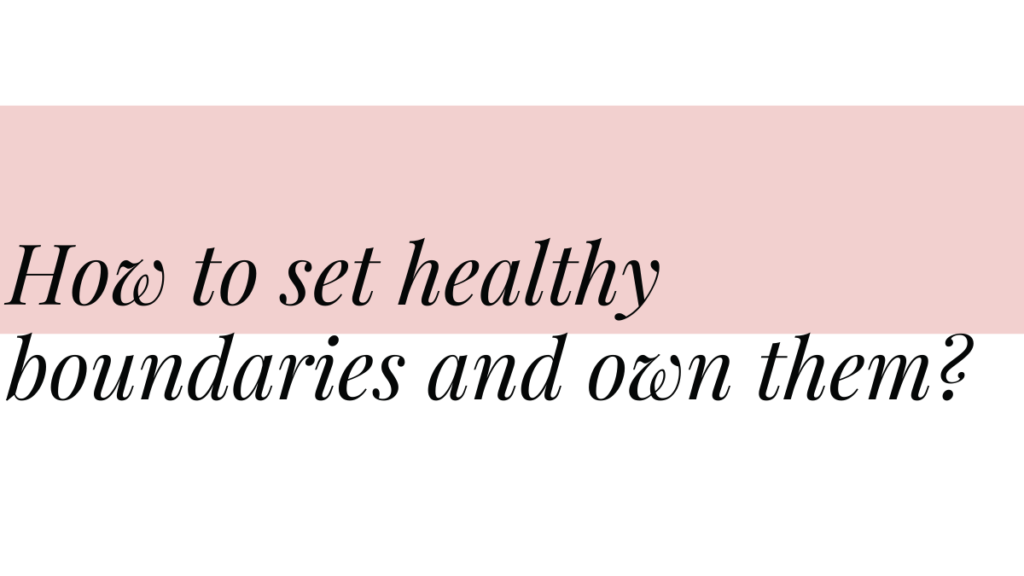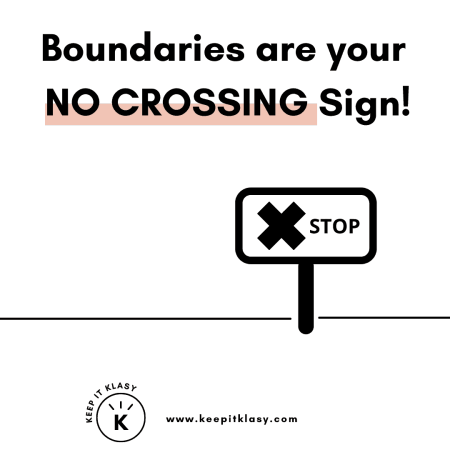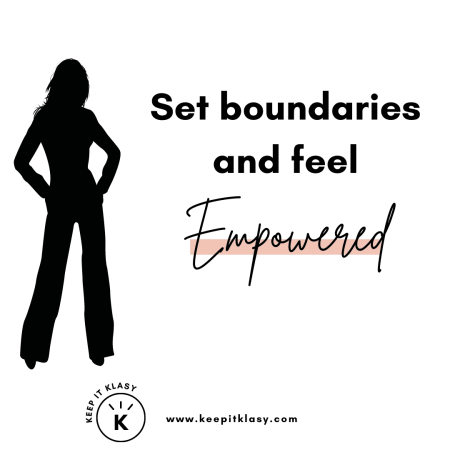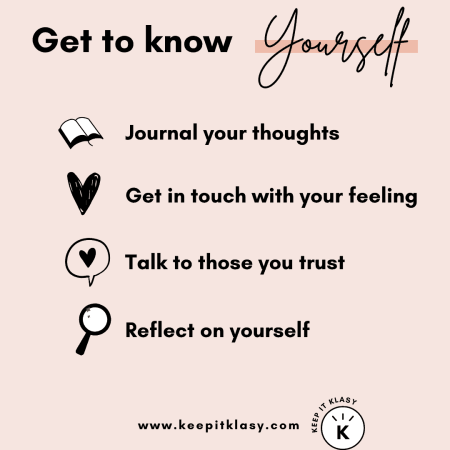
Setting healthy boundaries should be such a natural thing to do but often times it is one of the most difficult tasks. Some people seem to find it so much easier than others but for many of us (including me), it does not come with ease. But setting healthy boundaries is an absolutely essential ingredient to your happiness and learning how to do it effectively can massively benefit you in all areas of your life, whether work, business, or relationships.
If this is something you struggle with and you are a chronic people pleaser then this post is definitely for you.
How to set healthy boundaries and own them?
Disclaimer: This site contains affiliate links to products. We may receive a commission for purchases made through these links. Visit my disclaimer page for more information.

What are boundaries?
What exactly do we mean by boundaries?
Boundaries are essentially a set of guidelines, rules, or limits that you might create for yourself that define how you want to be treated and how people behave around you – what is acceptable and what isn’t. They align closely you’re your values and needs as a person. Boundaries also define how you will respond when these limits are crossed or disrespected. I think the second point is often where many people fail in keeping their boundaries. Without both elements, people may take advantage of you because you have not set the right limits.
It sometimes helps to visualise a boundary as an imaginary line with a “No Crossing” sign. As with a “No Crossing” sign, there may be consequences if someone violates the boundary.

Three types of personal boundaries – which one do you fall into?
When thinking about boundaries we can think of them in three different ways or categories. You might not fall exclusively into one or the other. At times, the category might be situation or person-dependent.
Rigid boundaries
This is one of the unhealthy boundaries a person may display.
Someone with rigid boundaries typically:
- Keeps others at a distance to avoid possible rejection
- Avoids intimacy
- Has few close relationships
- Does not open up to people and remains reserved
- Has poor relationships which lack intimacy
- Is scared to be vulnerable.
Porous boundaries
These are on the other extreme of rigid boundaries.
Someone with porous boundaries typically:
- Gets too involved with others’ problems and in others’ lives
- Has difficulty saying no
- Can be too understanding
- Depends on others validation and opinion
- Is compliant due to fear of rejection
- Allows themselves to be manipulated and suffers consequences
Healthy boundaries
Healthy boundaries on the other hand are just the right balance.
Someone with healthy boundaries typically:
- Value their opinion the most
- Does not compromise needs and values to please others
- Does not overshare but shares enough to build trust and intimacy
- Knows personal needs and wants and can effectively communicate them
- Can comfortably say no
- Does not fear rejection
Why setting healthy boundaries is important?
Boundaries are essential for your mental, emotional, and physical wellbeing. You deserve to be treated with respect and you deserve to have your needs and feelings valued. Setting boundaries is essential in any relationship because without them there is the potential for a power struggle, lack of trust, and resentment. No relationship can survive this for the long haul. So by setting boundaries you are valuing and respecting the relationship because you care enough to want to make it work.
Setting boundaries helps you to:
- Maintain your self-esteem
- Maintain your self-respect
- Protect your physical and emotional wellbeing
- Build relationships where responsibility and power are shared equally
- Build fulfilling relationships
- Help you filter out toxic, controlling, manipulative and abusive people.
- Build assertiveness
- Feel empowered
- Be happy
- Be your true self
- Build self-acceptance
- Establishing your identity
- Avoid burnout (emotional, mental, or physical)
- Unhealthy boundaries cause emotional pain and can lead to depression, anxiety, and high levels of stress

Barriers to setting healthy boundaries.
There are a number of things that can make it difficult for you to set boundaries. It can be very individual, and it could be an accumulation of various factors and your past experiences. It is crucial to understand yourself and your barriers because that will be the first step in overcoming them. These barriers and worries are perfectly normal, and every person has experienced them before they learned how to effectively set boundaries.
Common barriers:
- Fear of rejection or abandonment
- Fear of confrontation
- Feeling of guilt
- Low self-worth
- Feeling afraid of being vulnerable
- Never taught healthy boundaries
- Safety concerns
***NOTE***: if you think your physical or emotional safety might be at risk then it might be worth holding off setting boundaries directly with the person. Instead, in this case, it might be more helpful for you to speak to a counsellor or therapist or reach out for help from someone you trust.
Setting boundaries is uncomfortable when you are not used to it. But so is anything that requires growth and so it constantly having to ignore your wants and needs. When you learn to master the art of setting healthy boundaries you will grow and glow as a person.
Steps to setting healthy boundaries.
Understand that your boundaries matter.
Setting boundaries matters because your feelings matter. If you continually bend over for other people and compromise your needs to make others happy, you are disrespecting yourself. You will be compromising your happiness. If you are disrespecting yourself, you cannot expect others to respect you. In some cases, it might be that you have not communicated your feeling or needs to that person and therefore they may not even know that their words or actions are hurting you. Therefore, communicating your boundaries is essential.
There is of course a limit to how much you should expect people to respect your boundaries before they have to abandon theirs. This is why there needs to be clear communication and, in most cases, this will help to find a good balance for both of you.
Identify what your boundaries are.
To begin to set boundaries you first need to understand what those are for you. Ask yourself the following questions. They will help you to figure out those boundaries and help you see how they were crossed:
- What has upset you in the past?
- What behaviours in the past made you uncomfortable?
- When did you leave a situation thinking “I wish I said something back”?
- When have you been in a position where you froze unable to address a situation?
- When did you allow something to continue happening while resentment started building up inside you?
- You experienced those negative feelings because in those situations one of your boundaries was crossed.
Get to know yourself.
Feeling well grounded in who you are and accepting yourself the way you are is essential to building boundaries. You will begin to discover what you need as a person to be happy in all areas of your life. You will be able to see what your core values are and what you are and are not willing to compromise on so that you do not lose yourself in the process.
So how can you begin to better understand yourself?
Journaling:
Writing down your thought will help you in gaining clarity and evaluating your thought in a more objective way.
Getting in touch with your feelings:
Trust your feelings and do not ignore them.
Talk to those you trust:
Talking to people you trust can help you work through some of your thoughts. Sometimes just speaking your thoughts can be enough for you to evaluate them and begin to better understand yourself. Other times the unbiased opinions of others can help you view things from a wider perspective.
Self-refection:
Always reflect on your actions and their wider impact. You can learn a lot from this about yourself.

Know your rights.
Read or repeat these whenever you begin to feel your boundaries are being crossed. They will instantly empower you and help you feel grounded and assertive when you come to confront the situation.
- I have a right to say no without feeling guilty.
- I have a right to be treated with respect.
- I have a right to make my needs as important as others.
- I have a right to be accepting of my mistakes and failures.
- I have a right not to meet others’ unreasonable expectations of me.
Listen to your gut feeling.
It is very easy to start doubting that gut feeling. You will find a million excuses for why you might be feeling like something is off before you accept that it was simply your body telling you that something is not right. Listening to your gut feeling will help you establish when a boundary is being crossed, which is why it is important to tune in and listen to it. If you do not, you could miss a chance to express your feelings and confront a difficult situation. When you begin to get that knot in the stomach or you feel your fight or flight response kick in, know it is time to set a boundary or walk away.
Be firm.
When it comes to communicating your boundaries fewer words = more power!
Do not apologise for setting a boundary and do not feel like you have to justify it. This will only dilute your message. It can be extremely difficult and uncomfortable, and the emotions can be high but try remaining calm when getting your message across. If you ever feel you might crumble, then walk away from the situation and come back once your emotions have settled.
To help you remain firm in this situation you can use this statement:
I feel____________when____________because____________
What I need is____________
Example
Rather than:
I am sick of cooking every night.
Try this:
I feel upset when I have to cook dinner every night because it makes me feel like you do not value my time. What I need is for you to take responsibility for preparing the meals a few times a week, so I also have more time for things that are important to me.
Imagine how you would benefit from setting boundaries.
Remind yourself of why setting healthy boundaries is important. See section above.
Think about how amazing it would feel to know that you are doing something which is helping you be in alignment with yourself. Think how empowering it would feel to do something uncomfortable and to be assertive, so you never have to look back and regret not addressing difficult situations.
Set them early on.
It will never get easier with time; it will only get harder.
The longer you put it off and the longer you allow bad behaviour to go unchecked, the more difficult the confrontation will be. Take it from Mel Robbins and her 5-second rule…count back from five, 5-4-3-2-1, and just do it. If you let things slide by first before confronting them, then you might be met with confusion from the person you are setting the boundary with. They may not understand why you are only bringing this up not or why it was not a problem for you before. You will feel more guilty, and it will be more difficult to remain firm.
Learn to say no.
Remember that “NO” is a complete sentence.
You can use it without further explanation.
Sometimes that is the most powerful message you can leave behind.

Know that you are not responsible for the person’s reaction.
The people that have a problem with your boundaries are usually the ones that benefited from you not having them in the first place. Do not fall into that trap. If someone respects you, they will respect your boundaries. It is the manipulators, controlling and abusive people that might test you by having a strong reaction to you setting boundaries. You are not responsible for the person’s reaction, if they care about you, they will meet you with compassion.
Be consistent.
Do not go back on your boundaries. Do not be lenient especially when you still experience guilt after setting them. The guilt will pass but the pain of someone crossing your boundary repeatedly, will not.
Be ready to walk away if your boundaries are not respected.
Once you set the boundary you need to respect it before anyone else does. This means being willing to walk away if that boundary is crossed. This is why it is essential that you build that clear vision of who you are and what your boundaries are. Never compromise on and what your deal breakers are. This can be an extremely difficult step. However, staying in a situation where you are disrespected will not bring you happiness. You will begin to lose your sense of self and it will have a big toll on your well-being. Plus, you are missing a chance on finding a place or someone else that will respect them…
Get rid of toxic people in your life.
Toxic people: the manipulators and abusers, the people who try to control you or guilt trap you…get rid of them and do not look back. Listen to that gut feeling. If it tells you something is off about a person, it probably is. If something or someone is consuming your energy, it is probably toxic. Toxic people tend to prey on a lack of boundaries, and they will make it difficult for you to take the necessary step in learning how to establish them.
Surround yourself with a strong support network.
The people who you feel comfortable with, and you know you can trust will form your support network. Setting boundaries can feel overwhelming when you are not used to it. It can be useful to have someone to talk through it with. In addition, when you have that strong backbone of people behind you, that fear of rejection when placing boundaries can diminish. Even if you lose someone through setting boundaries, you still have plenty of loving people in your life. That can be very empowering.
Know that it takes time to master setting boundaries.
Setting boundaries is a skill in a way, especially if you want to learn how to do it in a constructive and meaningful way. So be patient with yourself and do not feel discouraged when you do not get things perfectly when you start. It is not as simple as just changing your words. It means changing yourself, growing as a person, and fighting some of your core beliefs about yourself. That is a big task, and you should not feel like you need to rush through this. Take small steps. With each one, you will grow and feel more empowered.
Book Recommendation
Teri Cole is an incredible psychotherapist who has written a whole guide on how to set boundaries in her book “Boundary Boss“. I recommend it for some extra insight and tips. You can also subscribe to her Podcast where she covers a wide range of topics related to Personal Development.
Keep these phrases in mind.
A good start is to keep these phrases in mind that you can use when you are lost for words at the moment…
- I can’t do that for you
- This is not acceptable
- Please don’t do that
- This doesn’t work for me
- I am drawing a line at
- Not this time
- I have decided not to
- I do not want to do this
Plan ahead.
Sometimes situations can take us by surprise so much that we completely freeze and are unable to respond in the given moment. That’s not so uncommon and I am sure everyone has had a least one example of a situation like that. In some situations, you cannot predict or prepare for and if you are taken back in those moments know that you can take yourself out of the situation before coming back and addressing it.
Other times there will be situations that you can predict, and you will be able to prepare for them. Take a moment and put yourself in that situation. Given everything you have learned, visualise how you can communicate your boundary effectively. If it helps you can write it down. You may be surprised that over time you sort of creating a new version of yourself. You will have created a bank of responses so even in unpredictable situations, you will be able to deal with them more effectively.
An example:
Situation: Your boss hands you a long task to complete 10 mins before you’re about to leave work. You are supposed to meet a friend for dinner.
Response: “Unfortunately I will not be able to stay behind to complete the task today as I have made plans already for the evening. I am happy to look at it tomorrow morning if there is no one else that can complete it tonight.
On a Final Note.
Setting boundaries will help you feel more in control of your life. In turn, you will feel more fulfilled in your work and relationships and you will be overall happier. It will be uncomfortable at first, but any type of growth is. In the end, you will benefit from this process for the rest of your life as you can live in complete alignment with your true self.
So start setting boundaries where necessary and own it!

